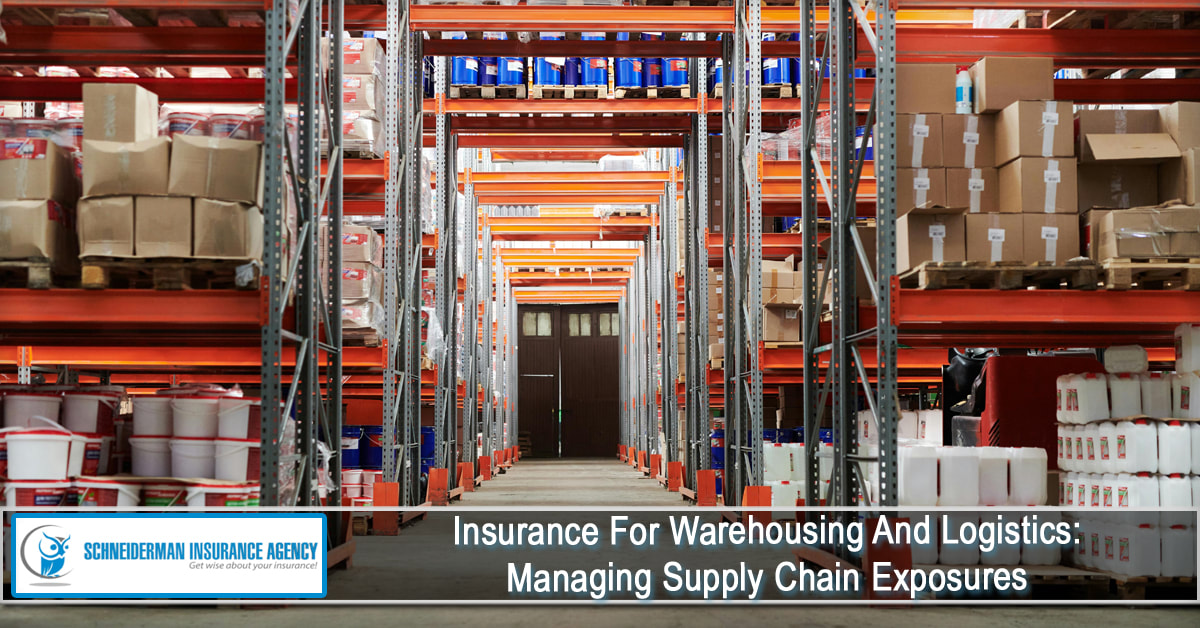Schneiderman Insurance Agency, Inc. Blog
|
|
In the fast-paced world of warehousing and logistics, managing supply chain risks is essential to ensuring the smooth operation of businesses and meeting customer demands. From inventory management to transportation logistics, various factors can impact the efficiency and security of the supply chain. Insurance plays a critical role in mitigating these risks and providing financial protection against potential losses. In this blog, we'll explore the importance of insurance for warehousing and logistics businesses and discuss key strategies for managing supply chain exposures effectively. Understanding Supply Chain Exposures:
Warehousing and logistics businesses face a wide range of exposures that can disrupt operations and lead to financial losses. These exposures may include inventory damage or loss, transportation delays, equipment breakdowns, natural disasters, theft, and liability risks. Without proper risk management measures in place, businesses may struggle to recover from unforeseen events and maintain business continuity. Importance of Insurance Coverage: Insurance coverage tailored to the specific needs of warehousing and logistics businesses is essential for protecting against supply chain exposures. Comprehensive insurance policies can provide coverage for property damage, inventory loss, business interruption, liability claims, and other potential risks. By securing adequate insurance coverage, businesses can minimize financial losses and recover more quickly in the event of a disruption to their supply chain. Business Insurance and Supply Chain Management: Business insurance plays a crucial role in supply chain management by providing financial protection against various risks that can impact operations. Property insurance covers physical assets such as warehouses, distribution centers, and equipment against damage or loss caused by fire, theft, vandalism, or natural disasters. Additionally, business interruption insurance helps cover lost income and extra expenses incurred during a temporary shutdown or disruption to operations, allowing businesses to continue operating while repairs are made. Liability insurance is another important component of business insurance for warehousing and logistics businesses. General liability insurance protects against claims of bodily injury or property damage arising from operations, while cargo liability insurance provides coverage for goods in transit against loss or damage during transportation. By carrying comprehensive liability insurance coverage, businesses can protect themselves from costly legal claims and lawsuits that may arise from accidents or incidents involving their operations. Conclusion: Insurance plays a critical role in managing supply chain exposures and protecting warehousing and logistics businesses against potential risks. By understanding the unique challenges and vulnerabilities of their supply chain operations, businesses can work with insurance professionals to develop tailored insurance solutions that provide comprehensive coverage against a wide range of risks. With the right insurance coverage in place, warehousing and logistics businesses can mitigate financial losses, safeguard their assets, and maintain business continuity in the face of unforeseen events. At Schneiderman Insurance Agency, we do our best to make sure that our clients are well-protected with affordable and comprehensive policies. To learn more about how we can help you, please contact our agency at (818) 322-4744 or Click Here to request a free quote. Disclaimer: The information presented in this blog is intended for informational purposes only and should not be considered as professional advice. It is crucial to consult with a qualified insurance agent or professional for personalized advice tailored to your specific circumstances. They can provide expert guidance and help you make informed decisions regarding your insurance needs.
0 Comments
Leave a Reply. |
Contact Us(818) 322-4744 Archives
October 2023
Categories
All
|


 RSS Feed
RSS Feed